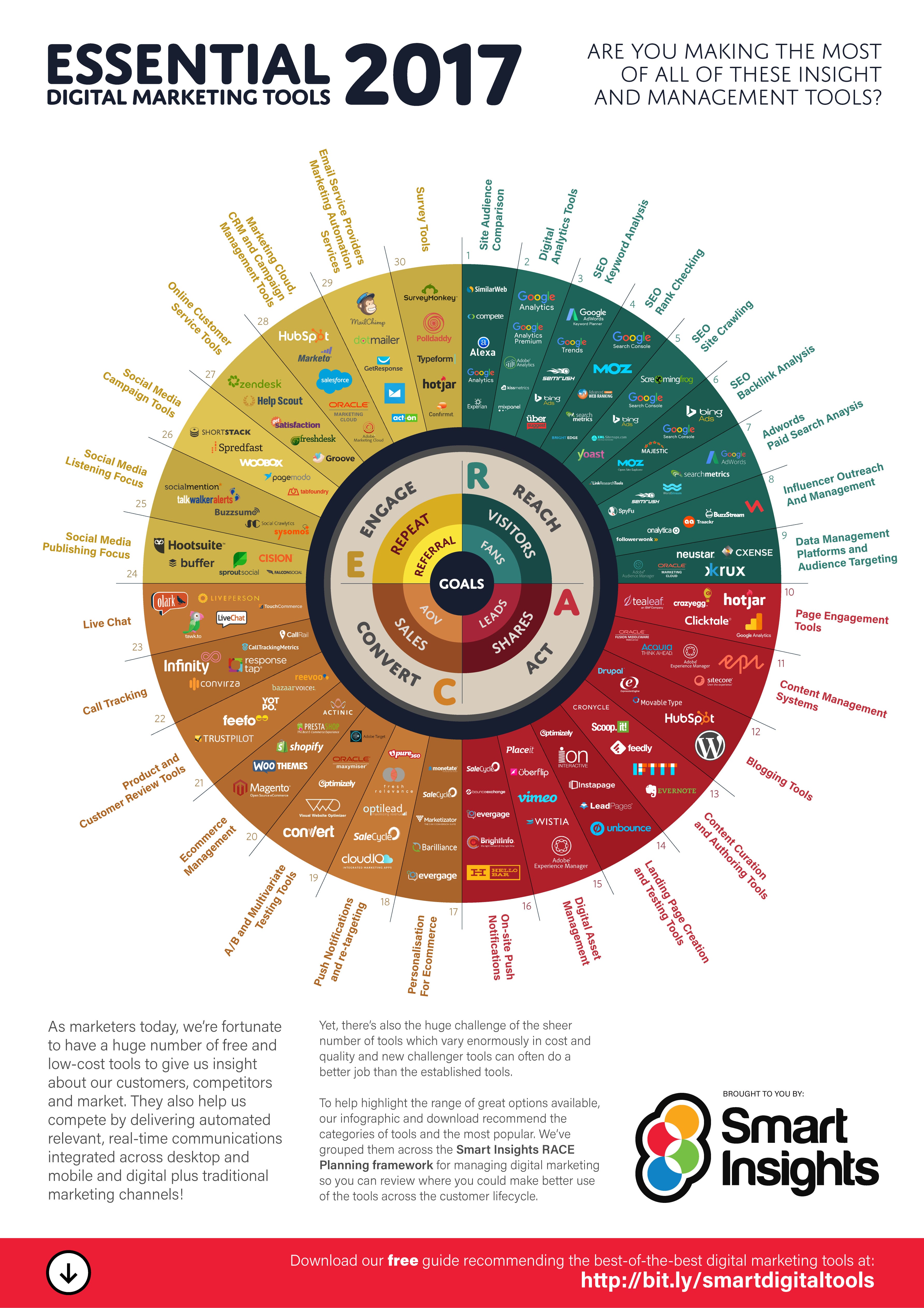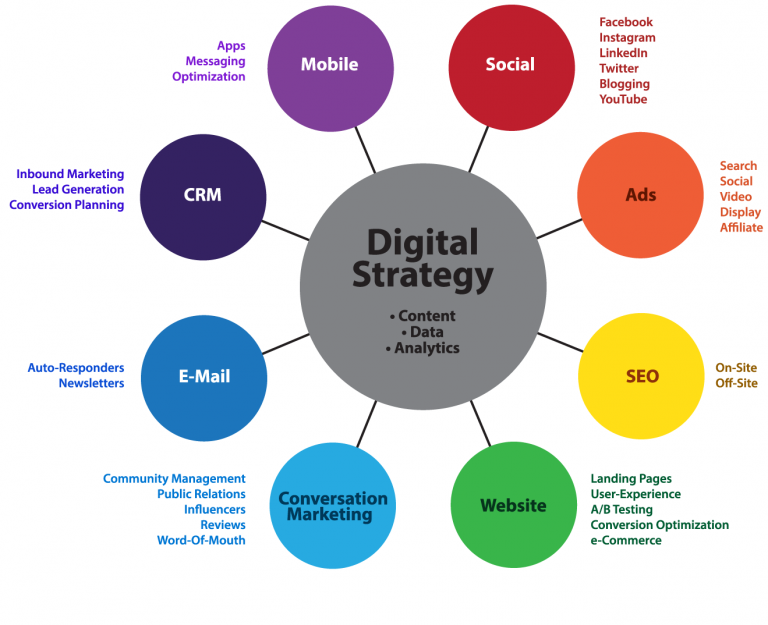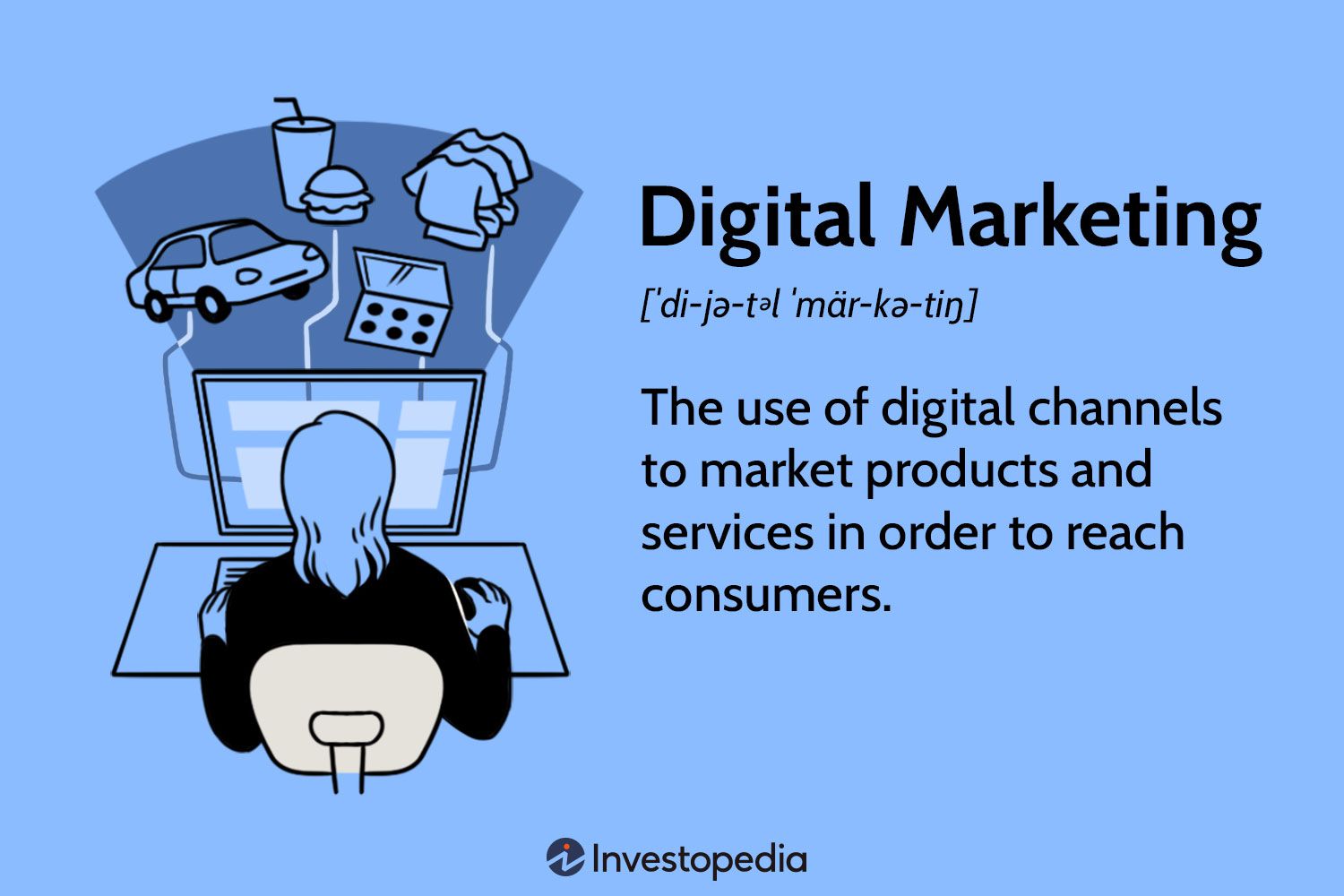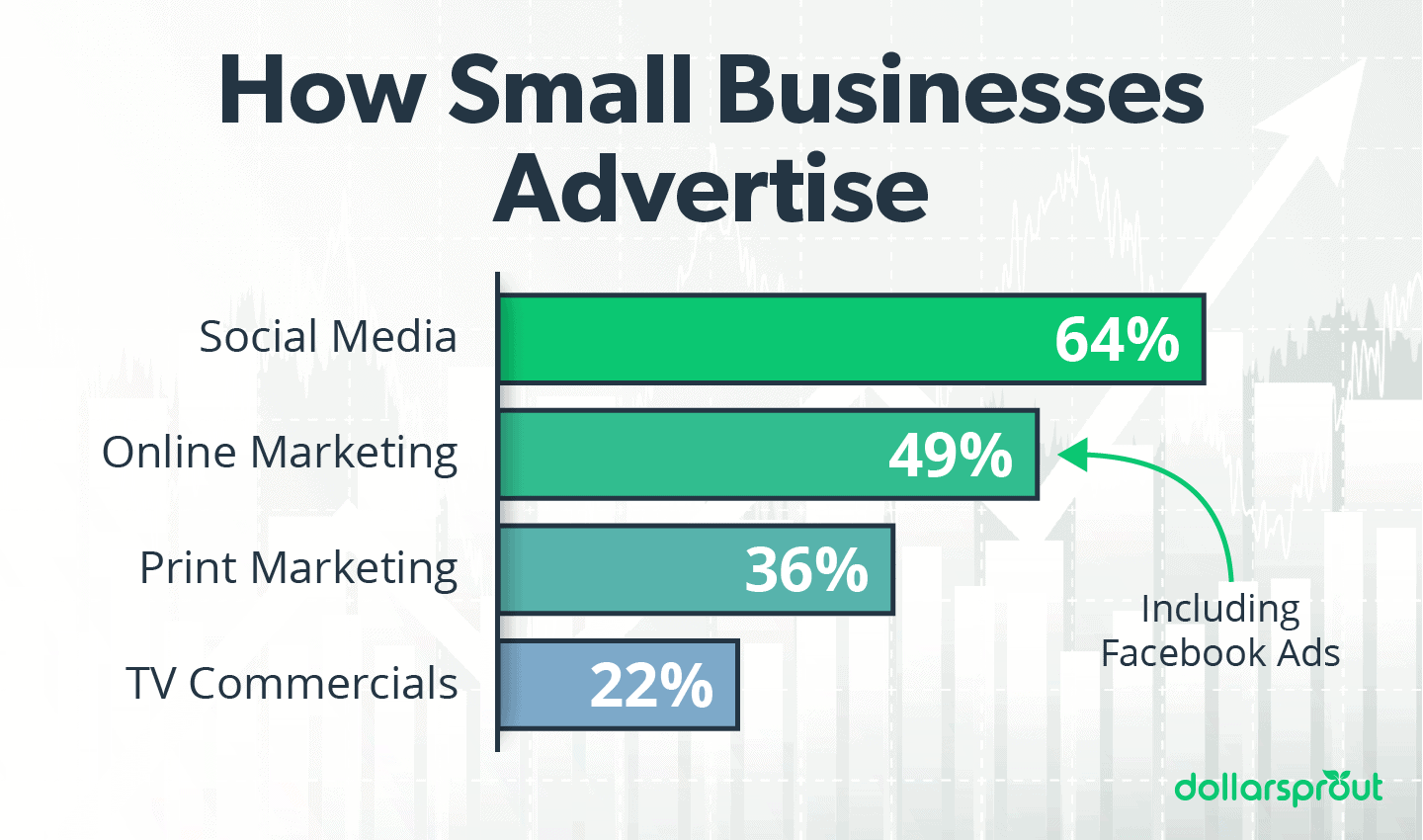Digital marketing tools streamline online marketing efforts. They help businesses reach and engage their target audience effectively.
Digital marketing tools are essential for businesses aiming to thrive in the digital landscape. These tools include SEO software, social media management platforms, email marketing services, and analytics tools. They provide valuable insights, automate repetitive tasks, and enhance marketing strategies.
By using these tools, companies can improve their online visibility, track performance, and engage with customers more efficiently. Investing in the right digital marketing tools can lead to increased brand awareness, higher conversion rates, and sustained business growth. Whether you are a small startup or an established enterprise, leveraging these tools can significantly impact your online marketing success.

Credit: www.smartinsights.com
Introduction To Digital Marketing Tools
Digital marketing tools help businesses reach their audience online. These tools are important for creating and managing campaigns. They also help track performance and optimize strategies.
Importance Of Digital Tools
Digital tools save time and effort. They automate tasks and provide useful insights. These tools help businesses grow by reaching a larger audience. They also help in understanding customer behavior.
With digital tools, marketing becomes more efficient. Businesses can measure the success of their campaigns. This leads to better decision making and higher returns on investment.
Evolving Landscape
The digital marketing landscape is always changing. New tools and technologies appear regularly. Businesses need to stay updated to remain competitive.
Some popular digital marketing tools include:
- Google Analytics – Tracks website traffic and user behavior.
- Hootsuite – Manages social media accounts in one place.
- Mailchimp – Helps in email marketing campaigns.
- SEMrush – Assists in SEO and keyword research.
These tools are just the tip of the iceberg. Many more tools are available and suited for different needs.

Credit: sproutsocial.com
Seo Tools For Better Visibility
Digital marketing thrives on visibility. To achieve this, businesses need strong SEO tools. These tools improve website rankings and drive organic traffic. Here, we explore essential SEO tools for better visibility.
Keyword Research
Keyword research is the backbone of SEO. It helps identify the terms people search for. Using these terms can attract more visitors to your site. Popular tools for keyword research include:
- Google Keyword Planner
- Ahrefs
- SEMrush
These tools provide insights into search volumes and competition levels. They also offer suggestions for related keywords. Knowing the right keywords can help you create targeted content.
On-page Optimization
On-page optimization involves refining individual web pages. This improves their search engine rankings. Key aspects of on-page optimization include:
- Title Tags
- Meta Descriptions
- Header Tags
- Content Quality
Tools like Yoast SEO and All in One SEO Pack help with these tasks. They analyze your pages and provide suggestions for improvements. A well-optimized page is crucial for better visibility.
Social Media Management
Social media management is crucial for businesses today. It helps in maintaining a consistent online presence. Effective management can boost brand visibility and engagement. Let’s explore some essential tools for social media management.
Scheduling Tools
Scheduling tools are vital for efficient social media management. They help in planning and automating posts. This ensures a consistent posting schedule. Here are some popular scheduling tools:
- Hootsuite: Allows scheduling and tracking across multiple platforms.
- Buffer: Simple interface for scheduling and analyzing posts.
- Sprout Social: Offers powerful scheduling and reporting features.
These tools save time and ensure your content reaches your audience regularly. They also help in maintaining a balanced and engaging content calendar.
Analytics And Insights
Analytics tools provide valuable insights into your social media performance. They help you understand what works and what doesn’t. Here are some top analytics tools:
- Google Analytics: Tracks social media traffic and conversions.
- Facebook Insights: Offers detailed data on page performance.
- Twitter Analytics: Provides metrics on tweet engagement and reach.
Using these tools, you can refine your strategies. They help in identifying trends and understanding audience behavior. This leads to more effective and targeted social media campaigns.
Email Marketing Platforms
Email Marketing Platforms are essential tools for businesses. They help manage and optimize email campaigns effectively. These platforms offer a range of features to streamline communication with subscribers, ensuring better engagement and higher conversion rates.
Automation Features
Email marketing platforms come with robust automation features. These features save time and ensure timely communication. The following table highlights key automation functionalities:
| Feature | Description |
|---|---|
| Auto-Responders | Send automatic replies to new subscribers or inquiries. |
| Drip Campaigns | Deliver a series of pre-written emails over time. |
| Behavioral Triggers | Send emails based on user actions like clicks or purchases. |
| Scheduled Emails | Plan and send emails at optimal times. |
Personalization Tactics
Effective email marketing relies on personalization tactics. Personalized emails resonate more with recipients. Here are some key tactics:
- Dynamic Content: Tailor email content based on user preferences.
- Segmentation: Group subscribers based on demographics or behavior.
- Personalized Subject Lines: Use the recipient’s name in the subject.
- Product Recommendations: Suggest products based on past purchases.
- Anniversary Emails: Send emails on special dates like birthdays.
Utilizing these features and tactics can boost engagement and drive sales. Email marketing platforms make these strategies easy to implement.
Content Creation Tools
Digital marketing thrives on engaging content. Creating compelling content requires the right tools. These tools help streamline the process, making it easier for marketers. Let’s dive into some of the best Content Creation Tools available today.
Graphic Design
Visuals are crucial in digital marketing. They grab attention and convey messages quickly. Here are some top graphic design tools:
- Canva: User-friendly with drag-and-drop features. Ideal for beginners.
- Adobe Photoshop: Advanced tool for detailed and creative designs.
- Piktochart: Simplifies the creation of infographics and presentations.
Using these tools, you can create eye-catching graphics. This enhances your content’s appeal.
Video Production
Videos engage audiences more effectively than text alone. Here are some popular video production tools:
- Adobe Premiere Pro: Comprehensive tool for professional video editing.
- iMovie: Apple’s simple yet powerful video editing software.
- Animoto: Great for creating videos with photos and video clips.
With these tools, producing high-quality videos becomes easier. This can significantly boost your digital marketing efforts.

Credit: medium.com
Pay-per-click (ppc) Management
Pay-Per-Click (PPC) Management is essential for online businesses. It helps you reach your target audience quickly. Effective PPC management boosts your return on investment (ROI). Let’s explore two key areas: Ad Creation and Budget Tracking.
Ad Creation
Creating ads is the first step in PPC management. Your ads must be compelling and relevant. Use keywords that match your audience’s search queries. Include a clear call-to-action (CTA). This encourages users to click on your ad.
Here are some tips for effective ad creation:
- Use high-quality images or videos.
- Write concise and clear headlines.
- Include benefits and features of your product.
- Test different versions to see which works best.
Budget Tracking
Budget tracking ensures you don’t overspend. It helps you allocate funds wisely. Use tools to monitor your spending. Adjust your budget based on performance.
| Tool | Feature |
|---|---|
| Google Ads | Detailed spending reports |
| Microsoft Advertising | Budget tracking alerts |
| Facebook Ads | Real-time budget updates |
Monitor these metrics for better budget tracking:
- Cost per click (CPC)
- Click-through rate (CTR)
- Conversion rate
- Return on ad spend (ROAS)
Keep a close eye on your budget. Adjustments are necessary to optimize performance.
Analytics And Reporting
In digital marketing, understanding your data is crucial. Analytics and reporting tools help you make sense of your data. They offer insights into customer behavior, campaign performance, and website traffic. These tools allow marketers to make informed decisions. Let’s explore two key aspects: Real-Time Data and Performance Metrics.
Real-time Data
Real-time data gives you instant insights. You can see how users interact with your content immediately. This helps you adjust your strategies on the fly.
- Track user activity as it happens.
- Quickly identify trends and patterns.
- Respond to user behavior in real-time.
Google Analytics and Mixpanel are great tools for real-time data. They provide live updates on user interactions. This helps you stay ahead of the game.
Performance Metrics
Performance metrics measure the success of your campaigns. They provide data on key performance indicators (KPIs). These include conversion rates, click-through rates, and return on investment (ROI).
| Metric | Description |
|---|---|
| Conversion Rate | Percentage of visitors who complete a desired action. |
| Click-Through Rate (CTR) | Percentage of users who click on a link or ad. |
| Return on Investment (ROI) | Measure of the profitability of a campaign. |
Tools like Google Analytics, SEMrush, and HubSpot excel in providing these metrics. They help you assess what works and what doesn’t. This allows you to optimize your strategies for better results.
Customer Relationship Management (crm)
Customer Relationship Management (CRM) tools help businesses manage customer interactions. They offer a centralized place to store customer data. This helps improve customer service and support. CRM systems are crucial for maintaining strong customer relationships.
Lead Management
Lead management is a key feature of CRM systems. It helps track potential customers from the first contact. This ensures no lead falls through the cracks. CRMs allow you to assign leads to specific team members. This helps in better follow-up and conversion.
| Feature | Benefit |
|---|---|
| Lead Tracking | Know the status of each lead |
| Lead Scoring | Identify high-potential leads |
| Automated Follow-ups | Never miss a follow-up |
Customer Engagement
Customer engagement is essential for business growth. CRM tools help engage with customers effectively. They provide insights into customer behavior. This helps in creating personalized experiences.
- Email Campaigns: Automate and personalize email marketing.
- Social Media Integration: Engage with customers on social platforms.
- Customer Feedback: Collect and analyze feedback for improvement.
CRM tools help in creating lasting customer relationships. They streamline communication and improve customer satisfaction.
Conclusion
Digital marketing tools are essential for success in a competitive online landscape. They enhance efficiency and drive measurable results. Embrace these tools to optimize your marketing strategies. Stay ahead by leveraging the best digital marketing resources. Your business growth depends on smart tool utilization.
Explore, implement, and watch your digital presence thrive.






